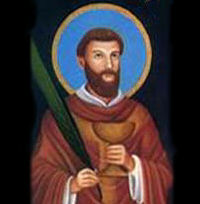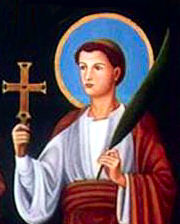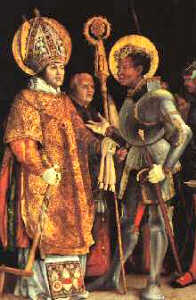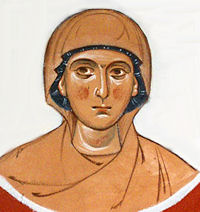June 2, 2014
Monday of the Seventh Week of Easter
While Apollos was in Corinth,
Paul traveled through the interior of the country
and down to Ephesus where he found some disciples.
He said to them,
“Did you receive the Holy Spirit when you became believers?”
They answered him,
“We have never even heard that there is a Holy Spirit.”
He said, “How were you baptized?”
They replied, “With the baptism of John.”
Paul then said, “John baptized with a baptism of repentance,
telling the people to believe in the one who was to come after him,
that is, in Jesus.”
When they heard this,
they were baptized in the name of the Lord Jesus.
And when Paul laid his hands on them,
the Holy Spirit came upon them,
and they spoke in tongues and prophesied.
Altogether there were about twelve men.
He entered the synagogue, and for three months debated boldly
with persuasive arguments about the Kingdom of God.
R. (33a) Sing to God, O kingdoms of the earth.
or:
R. Alleluia.
God arises; his enemies are scattered,
and those who hate him flee before him.
As smoke is driven away, so are they driven;
as wax melts before the fire.
R. Sing to God, O kingdoms of the earth.
or:
R. Alleluia.
But the just rejoice and exult before God;
they are glad and rejoice.
Sing to God, chant praise to his name;
whose name is the LORD.
R. Sing to God, O kingdoms of the earth.
or:
R. Alleluia.
The father of orphans and the defender of widows
is God in his holy dwelling.
God gives a home to the forsaken;
he leads forth prisoners to prosperity.
R. Sing to God, O kingdoms of the earth.
or:
R. Alleluia.
The disciples said to Jesus,
“Now you are talking plainly, and not in any figure of speech.
Now we realize that you know everything
and that you do not need to have anyone question you.
Because of this we believe that you came from God.”
Jesus answered them, “Do you believe now?
Behold, the hour is coming and has arrived
when each of you will be scattered to his own home
and you will leave me alone.
But I am not alone, because the Father is with me.
I have told you this so that you might have peace in me.
In the world you will have trouble,
but take courage, I have conquered the world.”
Catholic Culture

Collect: O God, who surround us with protection through the glorious confession of the Martyrs Saints Marcellinus and Peter, grant that we may profit by imitating them and be upheld by their prayer. Through our Lord Jesus Christ, your Son, who lives and reigns with you in the unity of the Holy Spirit, one God, for ever and ever.
o Overnight Basic Italian
o Fourteen Holy Helpers
o Religion in the Home for Preschool: June
o June Devotion: The Sacred Heart
o Litany of the Fourteen Holy Helpers
o Peter in Rome | Giovanni Ricciardi
» Enjoy our Liturgical Seasons series of e-books!
Old Calendar: Saints Marcellinus, Peter and Erasmus, bishop, martyrs; St. Blandina, martyr (Hist)
Peter and Marcellinus are two Roman martyrs who suffered under the Diocletian persecution, about the year 303; the first was an exorcist, the second a priest. Their cultus was so important that after peace was restored to the Church, Constantine built a basilica in their honor. Their names are mentioned in the Canon of the Mass (Eucharistic Prayer I).
According to the 1962 Missal of Bl. John XXIII the Extraordinary Form of the Roman Rite, today is the feast of St. Erasmus, a bishop in Asia Minor, who was martyred in Campania at about the same time. He is one of the Fourteen Holy Helpers. Historically it is also the feast of St. Blandina, a slave in the second century, who had been taken into custody along with her master, also a Christian.
St. Marcellinus and St. Peter

Peter, an exorcist, was cast into prison at Rome, under the emperor Diocletian, by the judge Serenus, for confessing the Christian faith. He there set free Paulina, the daughter of Artemius, the keeper of the prison, from an evil spirit which tormented her. Upon this, Artemius and his wife and all their house, with their neighbors who had run together to see the strange thing, were converted to Jesus Christ. Peter therefore brought them to Marcellinus the priest, who baptized them all. When Serenus heard of it, he called Peter and Marcellinus before him, and sharply rebuked them, adding to his bitter words threats and terrors, unless they would deny Christ. Marcellinus answered him with Christian boldness, whereupon he caused him to be buffeted, separated him from Peter, and shut him up naked, in a prison strewn with broken glass, without either food or light. Peter also he confined. But when both of them were found to increase in faith and courage in their bonds, they were beheaded, unshaken in their testimony, and confessing Jesus Christ gloriously by their blood.
Excerpted from The Liturgical Year, Abbot Gueranger O.S.B.
Things to Do:
- St. Marcellinus and Peter are included in the Roman Martyrology, originally a written catalogue of those saints who shed their blood for Christ during the early centuries of pagan persecution. Local churches celebrated each martyr's "birthday" into heaven, assigning the day of their final victory over the world as their feastday in the liturgical calendar. When she triumphantly arose from the catacombs, the Church gradually introduced other great saints, who were not slain for their faith, into the Martyrology as she combined the recorded Acta of both east and west. An official book of the Roman liturgy, its pages contain the names of thousands of our most valiant Catholic heroes and heroines along with a very brief biographical sketch commemorating either their martyrdom or their most enduring accomplishments. If you would like to purchase a copy you can do so at Amazon.com.
St. Erasmus

In Campania the bishop Erasmus was, under the empire of Diocletian and Maximian, beaten with clubs and whips loaded with lead, and afterwards plunged into resin, sulphur, melted lead, boiling pitch, wax, and oil. From all this he came forth whole and sound: which wonder converted many to believe in Christ. He was remanded to prison, and bound in iron fetters. But from these he was wondrously delivered by an angel. At last, being taken to Formi, Maximian caused him to be subjected to divers torments, being clad in a coat of red-hot brass, but the power of God made him more than a conqueror in all these things also. Afterwards, having converted many to the faith and confirmed them therein, he obtained the palm of a glorious martyrdom.
Excerpted from The Liturgical Year, Abbot Gueranger O.S.B.
He is invoked for intestinal diseases, for his legend asserts that he was tortured by winding his entrails round a windlass. He is also called St. Elmo, and the static electricity on boats, Saint Elmo's Fire, is named after him. He is one of the Fourteen Holy Helpers.
Patron: Abdominal pains; ammunition workers; appendicitis; birth pains; boatmen; childbirth; childhood intestinal disease; colic; danger at sea; explosives workers; intestinal disorders; mariners; navigators; ordinance workers; sailors; sea sickness; stomach diseases; storms; watermen; women in labor.
Symbols: Windlass or capstan wound with his intestines; ship; ravens bringing him bread; cauldron of molten lead; red-hot armour; three-pronged hook; cauldron of boiling pitch or resin.
St. Blandina

St. Blandina lived as a slave at Lyons, Gaul, in the 2nd century after Christ. She was one of the illustrious company of those martyred under the emperor Marcus Aurelius. She was apprehended together with her master, who was also a Christian. She endured every torment imaginable, to the extent that the tormentors confessed that they could not think of anything else to do to her. And to every question put to her, she gave the same answer: "I am a Christian, and we commit no wrong." Brought to the arena for fresh torments, Blandina was bound to a stake and wild beasts were released upon her but refused to harm her. She witnessed the podvigs (struggles) of all her fellows, and was the last to suffer martyrdom, by being placed on a red hot grate, enclosed in a net, and thrown before a wild steer, who tossed her into the air with his horns. In this manner the great martyr of Christ received her crown.
29. His disciples said to him, Lo, now you speak plainly, and speak no proverb.
30. Now are we sure that you know all things, and need not that any man should ask you; by this we believe that you came forth from God.
31. Jesus answered them, Do you now believe?
32. Behold, the hour comes, yea, is now come, that you shall be scattered, every man to his own, and shall leave me alone; and yet I am not alone, because the Father is with me.
33. These things I have spoken to you, that in me you might have peace. In the world you shall have tribulation; but be of good cheer: I have overcome the world.
CHRYS. The disciples were so refreshed with the thought of being in favor with the Father, that they say they are sure He knows all things: His disciples said to Him, Now you speak plainly, and speak no proverb.
AUG. But why do they say so, when the hour in which He was to speak without proverbs was yet future, and only promised? Because, our Lord's communications still continuing proverbs to them, they are so far from understanding them, that they do not even understand their not understanding them.
CHRYS. But since His answer met what was in their minds, they add, Now we are sure that you know all things. See how imperfect they yet were, after so many and great things now at last to say, Now we are sure &c. saying it too as if they were conferring a favor. And need not that any man should ask you, i.e. you know what offends us, before we tell You, and you have relieved us by saying that the Father loves us.
AUG. Why this remark? To one Who knew all things, instead of saying, you need not that any man should ask You; it would have been more appropriate to have said, you need not to ask any man; yet we know that both of these were done, viz. that our Lord both asked questions, and was asked. But this is soon explained; for both were for the benefit, not of Himself, but of those whom He asked questions of, or by whom He was asked. He asked questions of men not in order to learn Himself, but to teach them: and in the case of those who asked questions of Him, such questions were necessary to them in order to gain the knowledge they wanted; but they were not necessary to Him to tell Him what that was, because He knew the wish of the inquirer, before the question was put. Thus to know men's thoughts beforehand was no great thing for the Lord, but to the minds of babes it was a great thing: By this we know that you came forth from God.
HILARY. They believe that He came forth from God, because He does the works of God. For whereas our Lord had said both, I came forth from the Father, and, I am come into the world from the Father, they testified no wonder at the latter words, I am come into the world, which they had often heard before. But their reply shows a belief in and appreciation of the former, I came forth from the Father. And they notice this in their reply: By this we believe that you came forth from God; not adding, and are come into the world, for they knew already that He was sent from God, but had not yet received the doctrine of His eternal generation. That unutterable doctrine they now began to see for the first time in consequence of these words, and therefore reply that He spoke no longer in parables. For God is not born from God after the manner of human birth; His is a coming forth from, rather than a birth from, God. He is one from one; not a portion, not a defection, not a diminution, not a derivation, not a pretension, not a passion, but the birth of living nature from living nature. He is God coming forth from God, not a creature appointed to the name of God; He did not begin to be from nothing, but He came forth from an abiding nature. To come forth has the signification of birth, not of beginning.
AUG. Lastly, He reminds them of their w weak tender age in respect of the inner man. Jesus answered them, Do you now believe?
BEDE. Which can be understood in two ways, either as reproaching or affirming. If the former, the meaning is, you have awaked somewhat late to belief, for behold the hour comes, yea is now come, that you shall be scattered every man to his home. If the latter, it is, That which you believe is true, but behold the hour comes, &c.
AUG. For they did not only with their bodies leave His body, when He was taken, but with their minds the faith.
CHRYS. You shall be scattered; i.e. when I am betrayed, fear shall so possess you, that you will not be able even to take to flight together. But I shall suffer no harm in consequence: And yet I am not alone, because the Father is with Me.
AUG. He wishes to advance them so far as to understand that He had not separated from the Father because He had come forth from the Father.
CHRYS. These things have I said to you, that you might have peace; i.e. that you may not reject Me from your minds. For not only when I am taken shall you suffer tribulation, but so long as you are in the world: In the world you shall have tribulation.
GREG. As if He said, Have Me within you to comfort you, because you will have the world without you.
AUG. The tribulation of which He speaks was to commence thus, i.e. in every one being scattered to his home, but was not to continue so. For in saying, And leave Me alone, He does not mean this to apply to them in their sufferings after His ascension. They were not to desert Him then, but to abide and have peace in Him. Wherefore He adds, Be of good cheer.
CHRYS. i.e. raise up your spirits again; when the Master is victorious, the disciples should not be dejected; I have overcome the world.
AUG. When the Holy Spirit was given them, they were of good cheer, and, in His strength, victorious. For He would not have overcome the world, had the world overcome His members. When He says, These things have I spoken to you, that in Me you might have peace, He refers not only to what He has just said, but to what He had said all along, either from the time that He first had disciples, or since the supper, when He began this long and wonderful discourse. He declares this to be the object of His whole discourse, viz. that in Him they might have peace. And this peace shall have no end, but is itself the end of every pious action and intention.
Catena Aurea John 16





